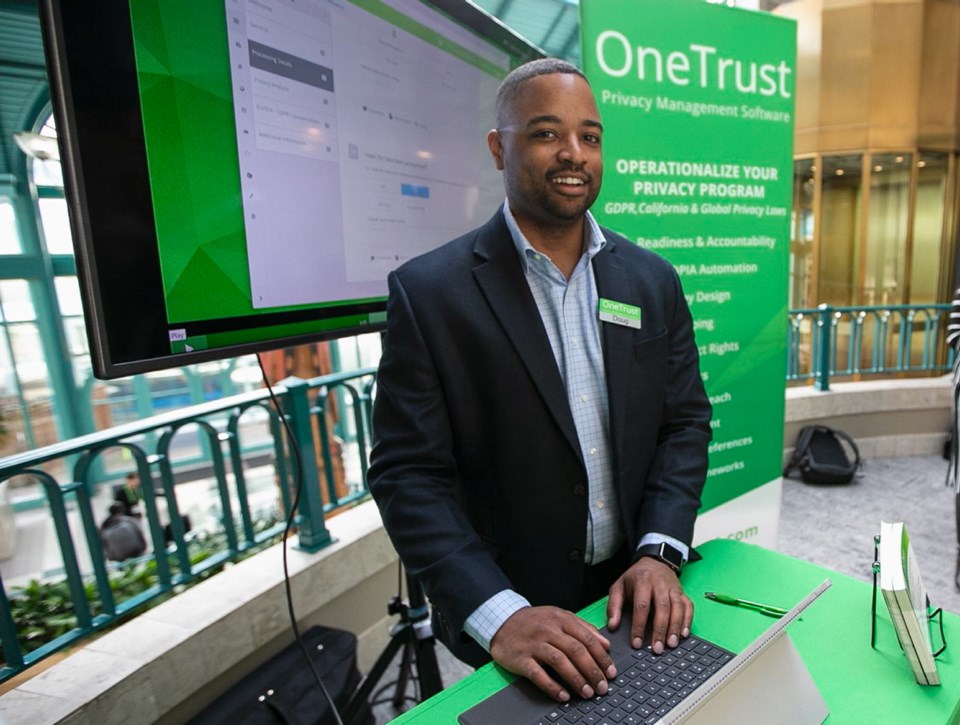Privacy may conjure thoughts of closed doors, darkness and secrets, but one of the world’s leading privacy experts says it would be more accurate to think of it as a pillar of freedom.
In an address to the 20th annual Privacy and Security Conference at the Victoria Conference Centre, Dr. Anne Cavoukian told the 1,000 delegates attending that privacy is essential to the concept of freedom.
“You cannot have open, free and democratic societies without a solid foundation of privacy,” said Cavoukian, a three-term Ontario information and privacy commissioner. “Privacy is all about control, personal control relating to the uses of your personal information. You have to be the one to decide how the information is used.”
Cavoukian’s appreciative audience was mainly a Canadian group of privacy experts, government and private sector executives and workers who deal with data and security. It’s a group that’s dealing with increased pressure on databases from nefarious hackers and rival governments, and who are charged with protecting information, individual rights and their companies or government agencies.
Cavoukian reminded them their work is essential. She suggested Canada and other regions would do well to follow the German model of enshrining privacy and security into the constitution.
“It’s no accident Germany is the leading privacy and data protection country in the world,” she said, noting it had to “endure the abuses of the Third Reich and the complete cessation of all of their privacy and all of their freedom. And when that ended, it said never again. Never again would they let the state rob them of their privacy and freedom.”
Cavoukian, who developed the concept of Privacy by Design, which strives to see privacy embedded into new technologies and business practices from their conception, said many countries have made great strides in data protection.
She welcomed the European Union’s introduction of the General Data Protection Regulation last year — it includes Privacy by Design — as a major step forward and something that sets a new standard for countries like Canada.
Cavoukian said to advance the concept, when it comes to privacy, governments and countries need to shed antiquated thinking like the zero-sum approach — one area can improve only if another suffers.
She argued a win-win, positive-sum approach is possible under Privacy by Design. She said by taking an approach where privacy and security are concepts embedded in the birth of a new idea, system or technology, any agency’s reputation and brand is enhanced.
“The gains are incredible,” she said, noting those that don’t and suffer a data breach will face lawsuits, tarnished reputations and a destruction of any brand loyalty and trust.
She also took on the myth that enhanced privacy stifles innovation, arguing privacy actually breeds creativity and innovation as people can express themselves and their ideas their way, without worrying about who’s looking or listening over their shoulders.
Cavoukian did warn surveillance continues to be a creeping threat, and countries such as the U.K. and Australia have introduced legislation in recent years to allow government more access to information and in the case of Australia a backdoor to access encrypted data.
She believes encryption is essential to protect data and that any backdoor established for government access will only serve to weaken security.
Cavoukian’s address was one highlight of a busy Thursday at the conference, which runs until this afternoon.
Audiences took in a presentation by Sir Bob Wainwright, a former executive director of Europol, who spoke of data being at the heart of the criminal economy, but when shared among policing agencies it can be a key tool in shutting down criminal enterprise.
There was a panel discussion on the ethics of artificial intelligence, with speakers weighing in on Canadian business adoption of artificial intelligence, the reluctance to put it into practice and the possible ethical issues that some AI applications could have.
There were also high-energy presentations from futurist Nikolas Badminton, who weighed in on the pace of the data-driven world and its likely effect on the individual, and Jeff Jonas, chief executive of Senzing, who spirited a rapt audience through the myriad issues of data management.



